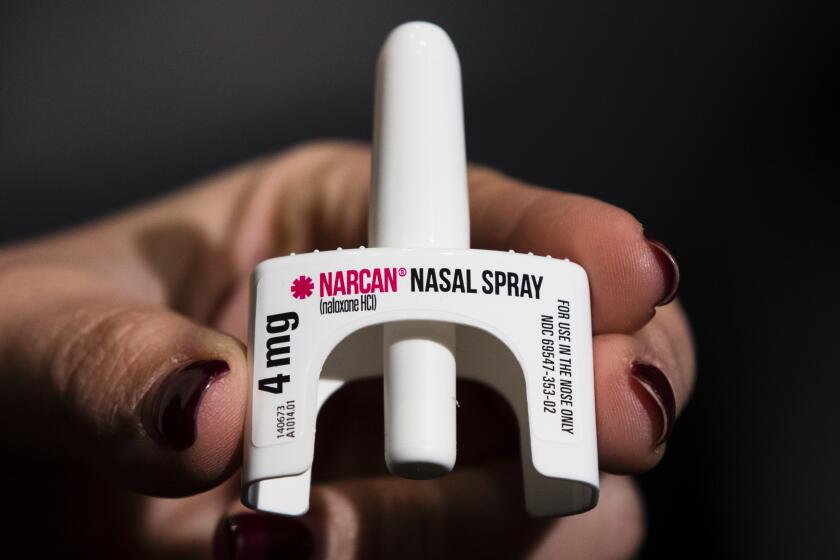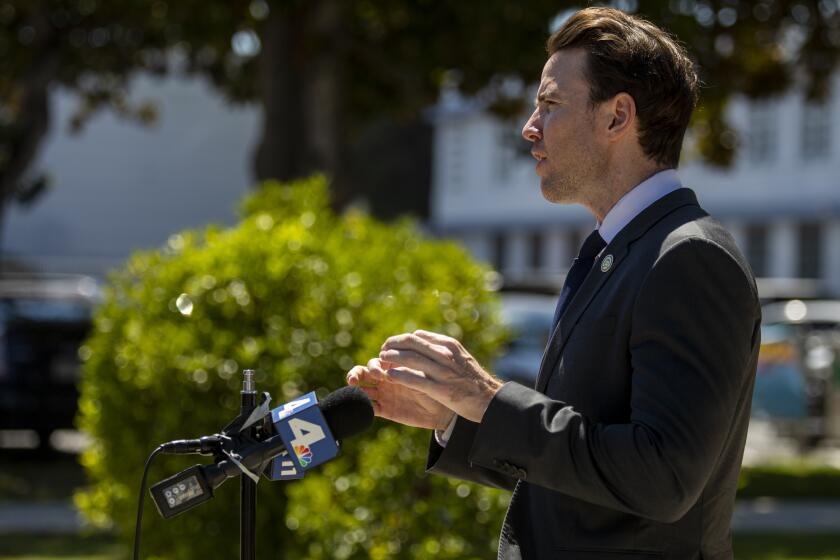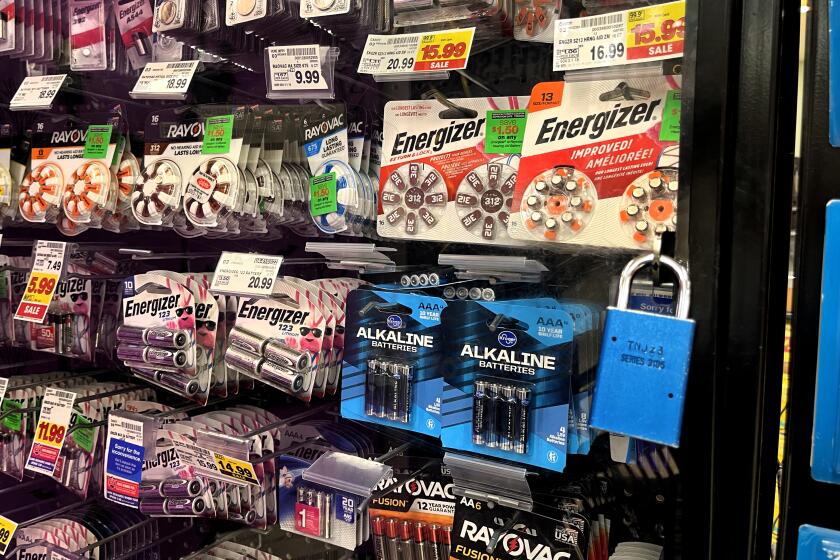No on Proposition 36. California shouldn’t revive the disastrous war on drugs

- Share via
- The problems the measure claims to address — retail theft, drug abuse and homelessness — are unrelated to Proposition 47, despite what proponents say. Proposition 36 would not have stopped them.
- People who fail to complete drug treatment would go to jail under Proposition 36, but the state’s jails are overcrowded and that space is needed for violent and dangerous criminals.
- Current law gives police the tools to stop petty thieves through misdemeanor arrests, but officers say it’s not worth their time.
Backers of Proposition 36 would have you believe that California’s criminal laws attract thieves and that public safety is not possible without long prison sentences for people holding illegal drugs for their personal use. They offer a ballot measure that would rescind voters’ smart reforms, partially refill prisons and revive the disastrous war on drugs.
They claim their solution will ramp up drug treatment and combat homelessness, when it is at least as likely to do the opposite. It would suck up much of the funding Californians recently approved for mental health care, and gut programs that have successfully slashed recidivism and brought much-needed trauma recovery services to crime victims.
From the top of the ticket to local ballot measures, California voters this year are grappling with major decisions that will shape their lives and communities for years to come.
Proposition 36 is a wrong turn. Voters saw through an earlier rollback attempt four years ago and would be wise to say “no” again.
The problems the measure claims to address — retail theft, drug abuse and homelessness — are to some degree intertwined. But despite proponents’ claims, they are unrelated to Proposition 47, a smart 2014 criminal justice reform measure that brought California’s theft law in line with other states and made drug possession for personal use a misdemeanor, punishable by up to a year in jail.
In addition to a precarious presidential election and high-stakes U.S House races, California voters in November will also weigh in on a slew of statewide ballot measures that could significantly shape policy.
The new measure would allow a third misdemeanor theft to be charged as a felony. For a person with two prior petty thefts, stealing a slice of pizza — to borrow the example of the three-strikes law’s notorious excess — could result in a counterproductive multiyear sentence without any new assurance of a law-abiding return to society at the end of the term.
Police could stop petty thieves now if they made misdemeanor arrests, as they can and sometimes should under current law. But they don’t, because they argue it’s not worth their time. They’re asking voters to change the laws to fit their accustomed practices, rather than update their practices to fit the laws they’re asked to enforce. Californians should expect police to follow the law, rather than the other way around.
If the goal of fentanyl laws is to prevent overdose and poisoning deaths, they should fund testing, treatment and information. Harsher criminal punishment only will only make the next drug even more deadly.
Police were caught flat-footed as smash-and-grab robbers, South American tourist burglars, copper wire thieves and online buyers and sellers of stolen goods wreaked havoc with new modes of crime. It took too long, but the authorities finally responded with task forces and first-rate detective work.
Now daily reports of arrests — literally thousands of them — are as common as videotaped robberies were just a year ago. They don’t evoke the same emotional response, yet the ongoing string of arrests is mind-boggling in its scope and is being followed by prosecutions.
Requiring two-thirds support to pass local taxes for parks, housing, transportation and other public investments is undemocratic. Proposition 5 would lower the threshold to pass a local bond measure to a more reasonable 55%.
Just Google “Los Angeles,” “theft” and “arrest” to find endless stories of people whose crimes made headlines a year or two ago finally being brought down.
Proposition 47 had nothing to do with these crimes, and Proposition 36 would not have stopped them. That’s because robbery, residential burglary and grand theft are already felonies, punishable with long prison sentences. The law as it exists is appropriate to deal with those crimes — whenever law enforcement is ready to use it.
As for repeat drug offenders, Proposition 36 would create a “treatment-mandated felony” on a third possession charge, meaning the accused would have to complete court-supervised drug treatment or be sentenced to a multiyear jail or prison term.
Three bills to roll back or repeal Proposition 47 are grounded in fear and falsehoods and should be rejected.
This component is based on several speculative or specious assumptions — that the accused is addicted, that drug courts prevent relapse, that effective treatment is widely available and that people with substance use problems will kick their habit even if they have no home, job resources or prospects. It also assumes that California’s serious problem with opioids and methamphetamine suddenly appeared when we eliminated felony possession charges. If that were the case, all those other states that still charge felony possession wouldn’t be suffering the same drug problems. But they are.
The standard for treating meth addiction is six months of residential treatment followed by outpatient follow-up, but the waiting lists for treatment beds are long, and Medi-Cal covers only 30 days (60 to 90 with special approval). Twenty-two counties have no residential treatment at all. Proposition 36 provides no funding. Backers say money could come from Proposition 1, barely adopted by voters in March — but that’s supposed to pay to treat mental illness, not just addiction recovery.
This tough-on-crime proposal won’t solve California retail theft, but it would crowd our prisons
Retailers including Walmart, Home Deposit and Target are backing a measure to undo effective criminal justice reforms.
People who fail to complete treatment — and almost everyone relapses after the first time — supposedly would go to jail, but jails in Los Angeles and most other large counties are legally overcrowded and jailers need that space for violent and dangerous criminals, not people convicted simply for drug possession, who probably would be released to the street. That probably means more homelessness, because even short jail stays strongly correlate with lost financial and emotional stability.
Instead of providing funding, the measure would deplete it. Proposition 47 has so far saved the state more than $800 million in prison spending, and that money is redirected to carefully monitored anti-recidivism programs, trauma recovery for crime victims and school programs. More felony convictions means lower savings and less spending on prevention and victim services.
Three bills to roll back or repeal Proposition 47 are grounded in fear and falsehoods and should be rejected.
California does have a serious property crime problem, including auto theft and burglaries, and it has recently begun to deal with it using the ample tools currently provided under state law. We do have a serious drug problem that requires a thoughtful response and enormous resources. Proposition 36 pretends the task can be accomplished on the cheap. It can’t. It’s more illusion than solution. Vote no.
More to Read
A cure for the common opinion
Get thought-provoking perspectives with our weekly newsletter.
You may occasionally receive promotional content from the Los Angeles Times.














